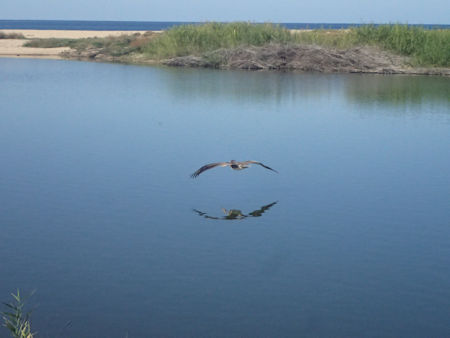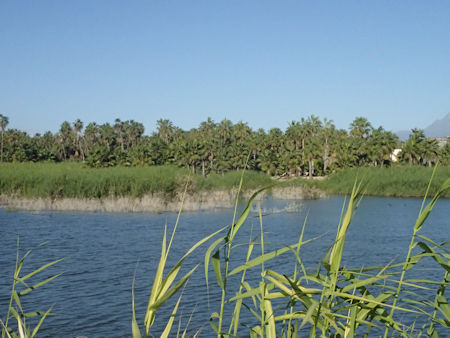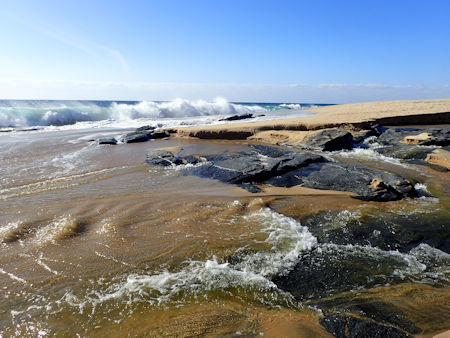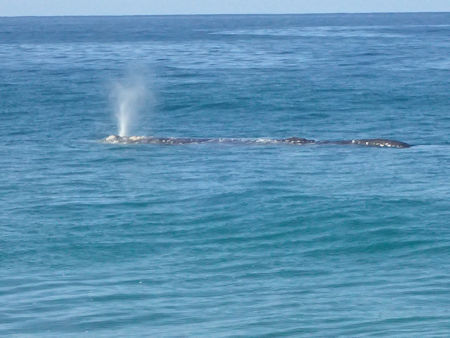 |  |
A visit to La Poza Lagoon and beach in Todos Santos, Baja Sur, Mexico.

Small exotic birds in their tens of dozens flutter around like insects, partially filling in the sky directly over the lagoon. Succeeding the heavier than usual rains this winter, the lagoon is once again relatively full of water and is teeming with life…
Most visitors to Baja’s southern-state have been to, or at least heard of, the Pueblo Mágico known as Todos Santos. This picturesque town is situated on the Pacific side of the peninsula off highway 19 around 48 kilometres north of Cabo San Lucas and the same approximate distance south-west of the city of La Paz over on the gulf side. Todos Santos sits amongst a natural coastal oasis. The centre of the town lays a few kilometres back from the coastline. There is easy access by road that will get you closer to the coast. You can take Calle Guaycura out of town, heading towards Hotel Posada La Poza to access the lagoon and beach.
Laguna La Poza is an area covering around 35 acres of which roughly 10 acres (varies seasonally) is water. It is comprised largely of fresh water that is channeled down from the Sierra de La Laguna mountain range. Since the lagoon is also influenced by seawater that comes over the sandy barrier separating it from the open ocean during times of high tides and increased wave energy, it is defined as being a brackish-water lagoon. This influx of saline and freshwater, together with the introduction of sediments of terrestrial origin, provides high levels of nutrients that makes estuaries in general some of the most productive ecosystems on the planet. The sediments lining the lagoon function like a giant sponge, absorbing more water than other sediment types. These soil deposits are held in place by the root systems of reeds and other aquatic plants associated with estuarine environments.

I elect for the over-hill hike to La Poza all the way from the town centre. The dirt road comes to an end and it is pedestrians only from this point. I take one of the narrow, rocky trails that goes along the south-eastern side leading down to the estuary’s mouth. The route takes me through tall reeds and other plant life that towers over me in places. The air is soon filled with the sounds of the calls of birds and the buzzing of insects, of which this habitat is crucial. Combined with the melody created by the cascading water close to the mouth of the estuary, the effects are hypnotic. Along the beachward path are numerous photo opportunities of the lagoon and wildlife. Though it is early February, the general vibe of my surroundings suggest that we are well into spring.
Of the 400+ resident and migratory bird species identified in Baja California Sur, around a quarter of them have been sighted right here, attracting locals and visitors to go in search of those species most dear to them and the most rewarding to find: American coots, cinnamon teals, lessor scouts, brown pelicans, Northern rough-wing swallows, hooded orioles, spotted sandpipers, orange-crown warblers, snowy egrets and, blue heron, to name but a few of the species I observed and identified with the help of some friendly bird enthusiasts I encountered along my way. The lagoon is also a haven for several endemic species including the Belding’s yellowthroat, Xanthus’s hummingbird and the gray thrasher. Meanwhile, a dozen or so magnificent frigate birds do their characteristic circling high in the sky over the lagoon area. They use thermal columns to climb as high as 4,000 metres above sea level. Studies have shown that they are capable of resting mid-flight, shutting down half of their brain function to conserve vital energy during long periods of flight.

While it is clear that Laguna La Poza is important to many species of birds and insects, another function of the lagoon and its plant life are to offer protection against coastal erosion from wave action and storm surge by dispersing the wave energy. Furthermore, the plants purify the water by converting nutrients and even harmful compounds while contaminants are locked away within the sediments of the lagoon. La Poza provides a place for storing excess water from ocean surge and heavy rains, acting as a natural buffer against the flooding of occupied areas.
In front of the lagoon, the beach, which is aptly named Playa La Poza, is extensive with miles of deep white sand extending away into the distance in both directions of the estuary’s mouth. While watching the powerful waves pound the beach, little did I expect that my field trip would culminate in hours of complimentary gray whale watching as a dozen or so individuals frolic in the water just offshore. First, an individual appears at the surface, exhaling with that tell-tale heart-shaped discharge from its spouts that gave me a pretty solid indication of the species I was observing. Before long, I was presented with quite the show of gray whales’ spy-hopping, lob-tailing and breaching, a perfect but unanticipated conclusion to my two-day field trip to immerse myself in and around the lagoon.

Laguna La Poza, and other habitats like it, are sensitive ecosystems that much wildlife, and humans, depend upon for survival. When visiting such places, it is important to do so in a manner that minimizes negative impact. Consider not taking shells or other natural materials away with you and take care with the plant life, particularly the dune flora that is a vital component of this fragile habitat.
For more information about visiting Laguna La Poza and its beach, you can contact me directly.
Contact:
+52 1 (612) 197 5824
Website
bajawildlifediaries[at]gmail.com

By far the best service for Mex insurance in Baja. They are personally there for you if you have...

Was planning to go to Mexico, but unfortunately my bike broke down. Got very friendly and fast...

Good seevice have use baja bound for many years good price....